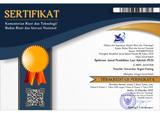Responding Households to Its Role as a Support for the Family Economy in RW 17 (Kampung KB Bangau Putih) Parupuk Tabing, Padang City
 ), Wirdatul Aini(2),
), Wirdatul Aini(2), (1) Universitas Negeri Padang
(2) Universitas Negeri Padang
 Corresponding Author
Corresponding Author
DOI : https://doi.org/10.24036/spektrumpls.v8i1.107871
Full Text:
 Language : en
Language : en
Abstract
This research is motivated by the number of housewives who work outside of homework. This study aims to reveal how the housewife's response to her role as a supporter of the family economy in RW 17 (Kampung KB Bangau Putih) Parupuk Tabing Village, namely: 1) in terms of position namely the position of housewives in terms of individuals, law, social society, religion and culture, 2) in terms of actions that are rational actions, value-oriented actions, affective actions, and traditional actions, and 3) in terms of behavior that is based on awareness, and feel attracted as a supporter of the family economy. This type of research is a quantitative descriptive study with a population of housewives who work outside of household workers, amounting to 96. Samples were taken as much as 30% of the population so as to get 30 people. The sampling technique used in this study is Stratified random sampling. Techniques for collecting data use a questionnaire and data collection tools in the form of a statement list. While the data analysis technique uses the percentage formula. The results of this study according to housewives showed a) The description of the responses of housewives to their role in terms of their position as supporting the family economy in RW 17 (Kampung KB Bangau Putih) Parupuk Tabing Village, Padang City was categorized as good. b) The description of the response of a housewife to her role in terms of actions as a support for the family economy in RW 17 (Kampung KB Bangau Putih) Parupuk Tabing Village, Padang City is categorized as good. c) The description of the response of housewives to their role in terms of behavior as a supporter of the family economy in RW 17 (Kampung KB Bangau Putih) Parupuk Tabing Village, Padang City is categorized as good. Suggestions for the head of the household are expected later this research should be able to be a motivation especially for the head of the household/husband to be able to work with his wife in sustaining the family economy. And for families so that this research should be an encouragement for all family members to work together in increasing family income, alleviating the burden on their husbands, and meeting all family needs.
Keywords: Responses, Housewives
References
Aini, W. (2006). Bahan Ajar Konsep Pendidikan Luar Sekolah. Padang: FIP UNP.
Anita, R. (2015). Harmoni dalam Keluarga Perempuan Karir: Upaya Mewujudkan Kesetaraan dan Keadilan Gender dalam Keluarga. Palastren, 8(1), 1–34. Retrieved from https://journal.iainkudus.ac.id/index.php/Palastren/article/download/932/866
Aswiyati, I. (2016). Peran Wanita dalam Menunjang Perekonomian Rumah Tangga Keluarga Petani Tradisional untuk Penanggulangan Kemiskinan di Desa Kuwil Kecamatan Kalawat. Jurnal Holistik, 9(17), 1–18. Retrieved from https://ejournal.unsrat.ac.id/index.php/holistik/article/download/11188/10778
Fitlayeni, R. (2013). Tipologi Kelompok Enterpreneurship Minangkabau (Kasus Perempuan Pedagang di Pasar Nagari). Jurnal Pelangi, 5(1), 39–46. https://doi.org/10.22202/jp.2012.v5i1.6
Hanum, S. L. (2017). Peran Ibu Rumah Tangga dalam Membangun Kesejahteraan Keluarga. Academica: Journal of Multidisciplinary Studies, 5(2), 1–9. Retrieved from http://ejournal.iainsurakarta.ac.id/index.php/academica/article/download/1030/290
Marzuki, S. (2012). Pendidikan Nonformal Dimensi dalam Keaksaraan Fungsional, Pelatihan, dan Andragogi. Bandung: Remaja Rosdakarya.
Maslow, A. (2013). Motivasi dan Kepribadian (Teori Motivasi dengan Pendekatan Hierarki Kebutuhan Manusia). Jakarta: PT. PBP.
Notoatmodjo, S. (2003). Pengembangan Sumber Daya Manusia. Jakarta: Rineka Cipta.
Nurliana, N. (2010). Wanita Karir Menurut Hukum Islam. Al-Fikra: Jurnal Ilmiah Keislaman, 9(1), 70–100. https://doi.org/10.24014/af.v9i1.3823
Presiden Republik Indonesia. Undang-Undang Republik Indonesia Tentang Sistem Pendidikan Nasional, Pub. L. No. 20 (2003). Indonesia. Retrieved from https://www.unpad.ac.id/wp-content/uploads/2012/10/UU20-2003-Sisdiknas.pdf
Ramadhani, N. (2016). Implikasi Peran Ganda Perempuan dalam Kehidupan Keluarga dan Lingkungan Masyarakat. Sosietas, 6(2). https://doi.org/10.17509/sosietas.v6i2.4245
Sajogyo, P. (1985). Peranan Wanita Dalam Perkembangan Masyarakat Desa. Jakarta: Rajawali Pers.
Saraswati. (2009). Status Ekonomi. Jakarta: Media Pustaka.
Suryono, Y., & Tohani, E. (2016). Inovasi Pendidikan Nonformal. Yogyakarta: Graha Cendekia.
Warsito. (2013). Perempuan dalam Keluarga Menurut Konsep Islam dan Barat. PROFETIKA: Jurnal Studi Islam, 14(2), 148–163. Retrieved from http://journals.ums.ac.id/index.php/profetika/article/download/2014/1432
Wawansyah, H., Iwang, G., & Ankiq, T. (2012). Kontribusi Ekonomi Produktif Wanita Nelayan terhadap Pendapatan Keluarga Nelayan. Jurnal Perikanan Dan Kelautan, 3(3), 95–106. Retrieved from http://jurnal.unpad.ac.id/jpk/article/view/1415
Widyastuti, A. (2012). Analisis Hubungan Antara Produktivitas Pekerja Dan Tingkat Pendidikan Pekerja Terhadap Kesejahteraan Keluarga Di Jawa Tengah Tahun 2009. Economics Development Analysis Journal, 1(2). https://doi.org/10.15294/edaj.v1i2.472
 Article Metrics
Article Metrics
 Abstract Views : 150 times
Abstract Views : 150 times
 PDF Downloaded : 75 times
PDF Downloaded : 75 times
Refbacks
- There are currently no refbacks.

This work is licensed under a Creative Commons Attribution-NonCommercial 4.0 International License.



